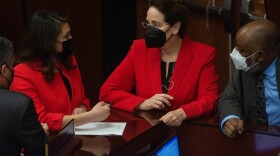As many as one in four Nevadans could be on Medicaid by the end of fiscal year 2023, according to an analysis by the Nevada Department of Health and Human Services. That’s forcing state lawmakers to navigate the muddled waters of creating long-term policy during a crisis. KUNR’s Paul Boger spoke with Sen. Julia Ratti, a Democrat who represents the heart of both Sparks and Reno, about some of those issues facing the state.
Paul Boger: I think it's important to know you are the chair of the Senate Health and Human Services Committee. We are still squarely in a pandemic. I'm kind of curious how has that shaped your work as a policymaker over the last year?
Julia Ratti: So I think that you have seen through the special session, through some of the work that we're doing during the session, we have to stay focused on addressing the crisis. But for me, we also have to make sure that we're not forgetting about the medium-term and long-term work that needs to be done so that we have an approved health and human services system, so that the next time we have a crisis, we're in a better place. Right? So I think you have to balance that immediate response to make sure that the people who are experiencing COVID-19 right now, or the people who need access to Medicaid, food stamps, TANF [Temporary Assistance for Needy Families]. Lots of new people are qualifying for those important programs. Or that we're making sure that we're getting food, just generally, to people through food pantries and Meals on Wheels. There's just a lot happening because of the pandemic that's not just about COVID-19. So we have to deal with that, but we also have to do that long-term work.
I think the other thing that is really important to say is that we are really in the middle of two public health crises here. We have the public health crisis that is the pandemic, but the pandemic has also exposed the public health crisis that is racial and socioeconomic injustice. And we are seeing that this pandemic is laying bare how people of color, people of lower incomes, are more dramatically affected because of the systemic work we haven't done over the last decades.
Boger: What do you mean work? Like what?
Ratti: Well, I'll take the behavioral health crisis response as a pretty good example. We know that people of color are disproportionately represented in our criminal justice response. We know that when we roll a law enforcement officer to any call that ... a higher percentage of people of color will be involved in those interactions. That's a systemic problem that we have.
So if you tackle the issue of “Do we have the right behavioral health crisis response?” and we start responding with behavioral health professionals and peers — particularly peers with lived experience who might look like you, talk like you, be from your neighborhood — the likelihood that we're going to get a better behavioral health response outcome for everyone. But particularly for people of color who've been disproportionally affected by having the 911 system be the primary response for somebody who's in a behavioral health crisis. That's how you are addressing through policy, both public health and racial inequity.
Boger: Well, you mentioned affordable housing a few minutes ago. That is a problem that is just continuing to plague the Truckee Meadows, especially. What action needs to be done, I guess, on that state level at this point, to actually move something forward? Because it just feels like we've been talking in circles around this issue for the last, I don't know, five or six years, since we've known each other at least.
Ratti: Sure. I mean, I think the challenge with housing is there's no silver bullet, right? I mean, if there was a wonderful law that I could pass tomorrow that was going to completely address housing insecurity, I would do it in a second. But there are really meaningful, important things that we can do. Thinking of crisis response during the pandemic. The combination of rental assistance to get folks money so that they're not losing their housing in the middle of a public health crisis with eviction moratoriums. Again, so that folks aren't losing their housing in the middle of a public health crisis and mediation programs. So we can start to work with the landlord and the tenant to make sure that they're accessing that rental assistance so that no one tenant or one landlord is bearing the brunt of this entire pandemic. Those are critical responses.
And when we know that there are more, again, people of color who tend to be low income, and it's disproportionately affecting them, it’s critically important that we get that right, and we do as much of that as possible. Then we have to start dealing with literally decades worth of not investing in enough affordable housing, subsidized units for people who really need it. A senior citizen, who's worked their entire life, they're on a fixed income now. And the housing in our community is just going up by such an extraordinary amount that they can no longer afford a unit. We need to make sure that we're building more subsidized units like that. And we need to make sure that we're preserving the ones that we have.





